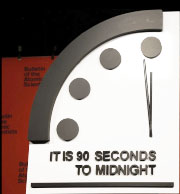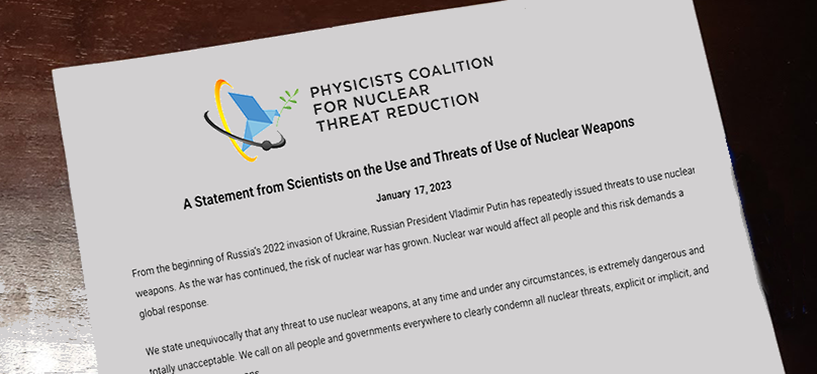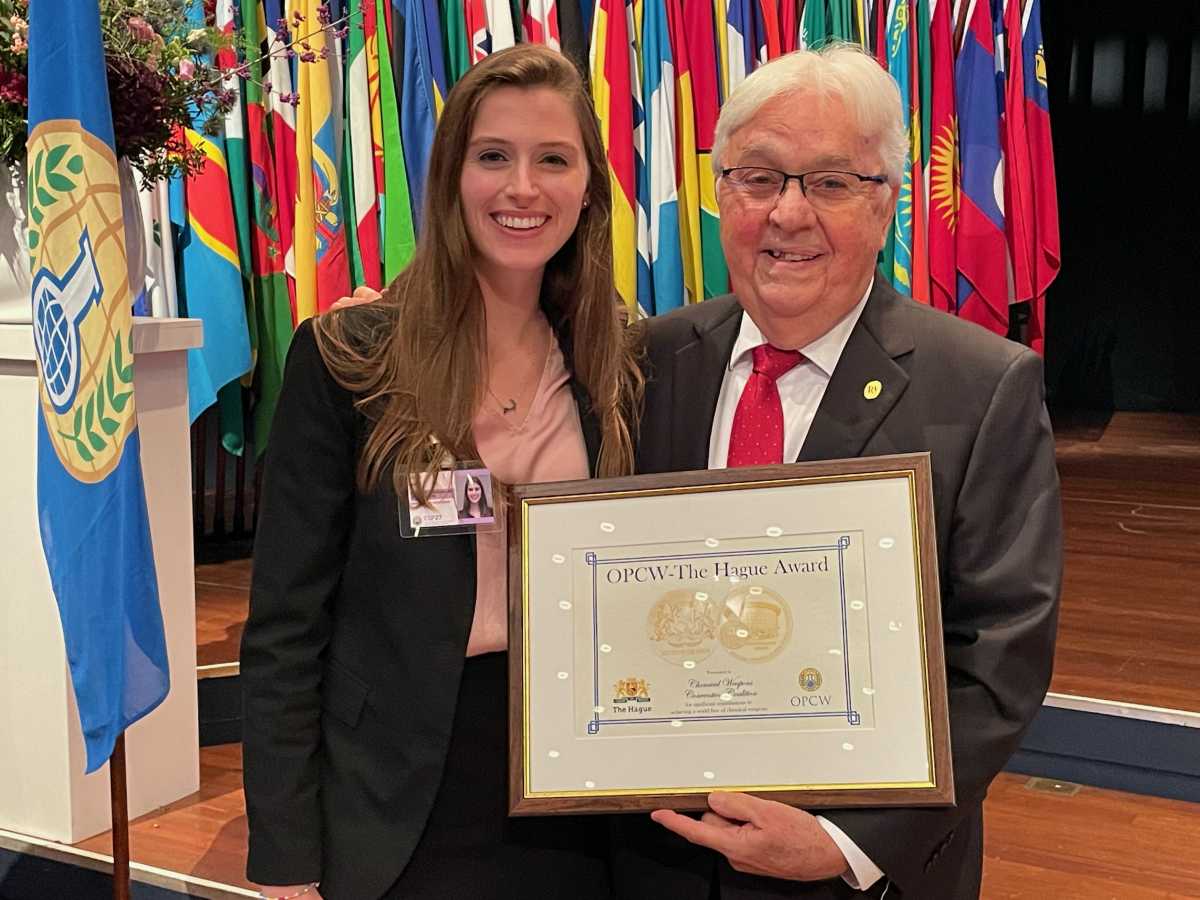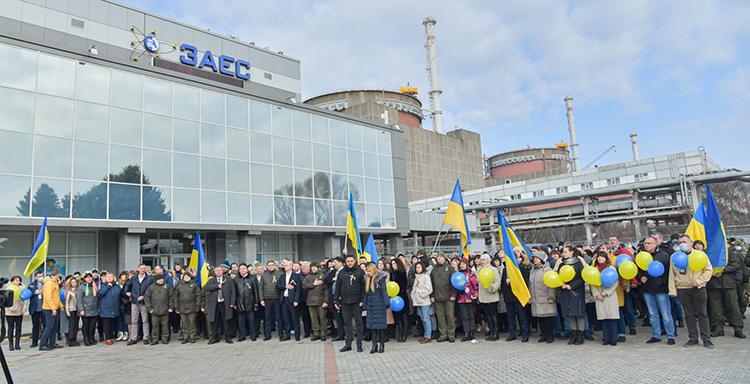Inside the Arms Control Association
January 2023
Since Russia’s illegal invasion of Ukraine last February, our work to reduce and eliminate the dangers posed by nuclear weapons has become even more challenging. It is no wonder that our partners at the Bulletin of the Atomic Scientists moved their “Doomsday Clock” 10 seconds closer to midnight.
 Despite support from President Biden, U.S.-Russian nuclear risk reduction and arms control talks remain on hold. The last remaining bilateral nuclear arms control agreement, New START, will expire in just 1,106 days. Unless Washington and Moscow begin serious negotiations on a new arms control framework, Russian and U.S. nuclear arsenals will be left unconstrained for the first time since 1972.
Despite support from President Biden, U.S.-Russian nuclear risk reduction and arms control talks remain on hold. The last remaining bilateral nuclear arms control agreement, New START, will expire in just 1,106 days. Unless Washington and Moscow begin serious negotiations on a new arms control framework, Russian and U.S. nuclear arsenals will be left unconstrained for the first time since 1972.
Prospects for restoring mutual compliance with the 2015 Iran nuclear deal also remain bleak. Also, the United States and China have not yet started overdue talks on nuclear risk reduction and conflict prevention and tensions between Washington and Beijing remain tense. The nonproliferation system is under increasing stress.
On a positive note: thanks to a strong, unified response from civil society and the international community, President Putin walked back his brazen threats of nuclear weapons use in the context of his war on Ukraine.
As I wrote in Arms Control Today, the taboo against nuclear use and threats of use remains strong, for now, but we must remain vigilant. Russia might still use a nuclear weapon before the fighting in Ukraine ends, and there are other nuclear flashpoints around the globe.
2023 is a pivotal year. Our Board and staff will focus the bulk of ACA’s energies on:
-
Building support for negotiations to conclude a new U.S.-Russian nuclear arms control framework agreement to supersede New START.
-
Pressing governments and thought leaders to reinforce the taboos against threats of nuclear weapons use, nuclear testing, and nuclear war-fighting weapons.
-
Developing creative solutions to jump-start much-needed diplomacy to curb Iran's sensitive nuclear activities and halt and reverse North Korea’s nuclear and missile programs.
Our approach involves cooperation with allied research and advocacy organizations and leveraging our broad and diverse network of contacts and experts in the United States and around the world.
In the coming weeks, we will also publish two major staff reports on how to mitigate the risks posed by emerging and disruptive military technologies such as hypersonic missiles, new space weapons, cyberattacks, and lethal autonomous weapons.
Through ACA’s support for the Chemical Weapons Convention Coalition, we will help civil society efforts to strengthen the treaty and the norm against chemical weapons at the upcoming CWC Review Conference in May.
We invite you to remain engaged, take action, and to stay in touch in the months ahead.
Virtual Briefing: "Challenges and Prospects for Further U.S.-Russian Nuclear Arms Control,” Feb. 1
At a special briefing, Feb. 1 at 11:00 a.m. Eastern U.S. time, we will hear from deputy assistant to the president for defense and arms control, Cara Abercrombie, on the nuclear arms control impasse, followed by key experts on how and why the two sides can overcome differences over Russia’s war on Ukraine to maintain common sense constraints on the U.S. and Russian arsenals.
Ambassador Jarmo Viinanen, Amb. for Disarmament for Finland, and chair-designate of the 2023 Nonproliferation Treaty Preparatory Committee Meeting, will offer closing remarks on the role of nuclear arms control in strengthening European and global security.
1,000 Scientists Join Physicists Coalition Statement on Nuclear Threats

On Jan. 17, the Physicists Coalition for Nuclear Risk Reduction issued a powerful statement condemning any and all nuclear threats that has been endorsed by more than 1,000 scientists including some notable Nobel Laureates. The statement was distributed to policy leaders, including Russian and other members of the UN Security Council and all diplomatic missions to the UN in New York.
The statement is part of a continuum of efforts in the United States and internationally throughout 2022 and into 2023 to reinforce the norms against nuclear weapons use and threats of use.
The Physicists Coalition was established in 2019 to help inform and engage the physical sciences communities in the nuclear weapons policy discourse and to advocate for substantive changes in nuclear arsenals, force postures, and declaratory policies.
CWC Coalition Awarded OPCW-The Hague Prize
In December, the Organisation for the Prohibition of Chemical Weapons and the City of The Hague jointly awarded the prestigious OPCW-The Hague Award to the Chemical Weapons Convention (CWC) Coalition.
 The award recognizes “outstanding contributions to achieving a world free of chemical weapons. CWC Coalition coordinator, Leanne Quinn, and its chair, Dr. Paul Walker (pictured right), were in The Netherlands for the award ceremony.
The award recognizes “outstanding contributions to achieving a world free of chemical weapons. CWC Coalition coordinator, Leanne Quinn, and its chair, Dr. Paul Walker (pictured right), were in The Netherlands for the award ceremony.
The OPCW-The Hague Award began eight years ago after the OPCW was awarded the Nobel Peace Prize in 2013 for verifying the abolition of all declared chemical weapon stockpiles. The 2022 award was shared between three organizations: the CWC Coalition, the Federal Risks Brigade of the Federal Police of Argentina, and the Population Protection Institute of the Fire Rescue Service of the Czech Republic.
Ukrainian Nuclear Power Plant Staff Recognized as 2022 Arms Control Person(s) of the Year The Energoatom staff at Ukraine's Zaporizhzhia nuclear power plant (ZNPP) were selected as the 2022 Arms Control Persons of the Year through an online poll that drew more than 3,500 participants from nearly 80 countries.
The Energoatom staff at Ukraine's Zaporizhzhia nuclear power plant (ZNPP) were selected as the 2022 Arms Control Persons of the Year through an online poll that drew more than 3,500 participants from nearly 80 countries.
"The international community owes a debt of gratitude to the heroism and bravery of the Zaporizhzhia personnel, but this dire situation cannot continue,” said Kelsey Davenport, director for nonproliferation policy. “The ongoing safety and security risks underscore the critical importance of establishing a zone of protection at the site, returning control of Zaporizhzhia to Ukraine, and strengthening the norm against targeting civilian nuclear infrastructure,” she added.
The runner-up in this year’s contest was Archbishop John Wester of Santa Fe, nominated for preaching the nuclear disarmament gospel in a religious context and reflecting the Catholic Church's long history of speaking out against the threats posed by nuclear weapons.
Our Work Depends on Your Support.
If you value our information, news, and analytical resources, please consider making a donation or becoming a member of ACA. You can now make monthly recurring donations or join as a monthly sustaining member. Thank you.
Donate $5 monthly · Donate $20 monthly · Donate $50 monthly · Donate another amount
ACA In the News
-
Executive director Daryl Kimball described the Treaty on the Prohibition of Nuclear Weapons (TPNW) as “one of the few bright spots” in arms control recently in Responsible Statecraft, Jan. 20.
-
Former comms intern Michelle Liu, now an editor at the Carolina Political Review, cited nonproliferation policy director Kelsey Davenport in “The Relationship Between Iran’s Nuclear Program and Regime Protests Continues To Unravel,” Jan. 16
-
Reuters reported on the ACA-led initiative, involving more than 100 arms control, environmental, and other activist groups, urging the Biden administration to apologize to the Marshall Islands for the impact of massive nuclear testing there in the 1940s and '50s, Jan. 10
-
Senior policy analyst Shannon Bugos noted “incrementalism” in arms control “may be the only option available right now,” in Vox’s “The treaties that make the world safer are struggling,” Jan. 5.
-
Board chair Thomas Countryman commented on U.S. and South Korean deterrence policy following South Korean President Yoon’s remarks about acquiring nuclear weapons in Haaretz, Jan. 3.
-
Newsweek cited research associate Gabriala Rosa Hernandez on U.S. policy being based on giving Ukraine the weapons that "are relevant for the current fight," Dec. 5.
-
Kimball spoke to Radio Free Europe/Radio Liberty on what might be happening behind the scenes in Moscow regarding talks over New START inspections, Dec. 2.
